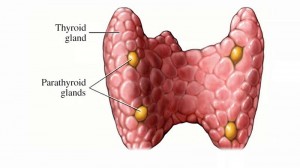
The question sounds funny, as if it’s nobody’s business how any of your glands are doing. However, parathyroid health is a serious factor for a lot of people. Thyroid disease gets a lot of press because the thyroid gland controls metabolism. Since metabolism is closely related to weight gain and loss, it bears a very visible and obvious link to overall health. It is almost impossible to ignore issues with your thyroid gland, but what about your parathyroid glands? What do they do, and how can you tell if they are healthy?
 The parathyroid glands control the amount of calcium you have in your blood and in your bones. Malfunctioning of the parathyroid glands usually falls into one of two categories – hyperparathyroidism or hypoparathyroidism. Hyperparathyroidism is, as you might guess, the case when your parathyroid glands are overactive. Hypoparathyroidism occurs when your parathyroid glands do not produce enough parathyroid hormone to meet your body’s needs.
The parathyroid glands control the amount of calcium you have in your blood and in your bones. Malfunctioning of the parathyroid glands usually falls into one of two categories – hyperparathyroidism or hypoparathyroidism. Hyperparathyroidism is, as you might guess, the case when your parathyroid glands are overactive. Hypoparathyroidism occurs when your parathyroid glands do not produce enough parathyroid hormone to meet your body’s needs.
In the case of hyperparathyroidism, the parathyroid glands produce too much parathyroid hormone (PTH). Too much PTH secretion leads to raised calcium levels in the blood and bones. This sometimes occurs in response to low calcium levels in the body from malnutrition or lack of Vitamin D intake. In this case, symptoms are often indirect and may include depression, loss of appetite, vomiting, constipation, cognitive impairment, and/or kidney stones, among others. Diagnosing hyperparathyroidism is often difficult because the raised calcium level does not create specific symptoms on its own.
Primary hyperparathyroidism occurs because of some problem with one or more of the four parathyroid glands. A noncancerous growth (adenoma) on a gland is the most common cause. Enlargement (hyperplasia) of two or more parathyroid glands accounts for most other cases. A cancerous (malignant) tumor is a rare cause of primary hyperparathyroidism. Primary hyperparathyroidism usually occurs randomly, but some people inherit a gene that causes the disorder.
Hypoparathyroidism is an uncommon condition where your body secretes abnormally low levels of PTH. In this case, with decreased PTH comes decreased calcium levels. If you have a good diet and get plenty of dietary calcium and vitamin D, but you still find yourself getting muscle cramps and contraction issues, fatigue, weakness, insomnia, and/or bone pain, you may have hypoparathyroidism. These are all symptoms of a lack of calcium. If you feel that you get enough calcium in your diet and rest enough that you should not be experiencing fatigue or weakness, you should absolutely consult your doctor about your parathyroid health.
How are parathyroid issues treated? Unhealthy parathyroid glands can take years off of your life and add a lot of pain and fatigue that you just don’t need. To get back to a normal, healthy life when you have parathyroid disease, there are a few options. Hyperparathyroidism often requires the removal of the over-functioning parathyroid gland. This can go one of two ways. Either the remaining parathyroid glands work properly, in which case nothing further is needed, or the remaining parathyroid gland is moved to another part of the body. This is called autotransplantation. In many cases, the autotransplanted parathyroid gland works normally post-surgery and no other treatment is necessary.
Hypoparathyroidism is a little more difficult to manage, as extreme cases can have serious consequences. Sometimes intravenous calcium is needed to increase calcium levels. This is not a long-term solution. Long-term treatment requires Vitamin D and calcium supplements. Research is still being conducted for a safe replacement for PTH, as there is not one yet on the market.
Parathyroid issues can be frightening, but if caught early, they can be treated and maintained. Though calcium excess or deficiency is not as visible as weight loss or gain, if you pay attention to your energy levels, your diet, and your overall state of mind, you may be able to catch an issue before it becomes a threat to your life. Talking to a thyroid specialist can help you put your metabolic and calcium health questions to bed. Never play doctor on yourself, or you’ll convince yourself that you have every disease and disorder known to modern medicine, but pay attention and keep in touch with your doctor, and you can rest assured you’ll stay healthy and happy.
